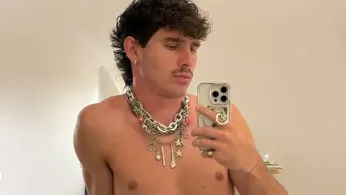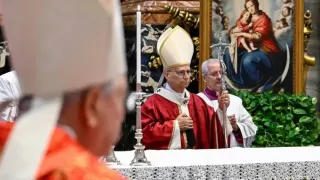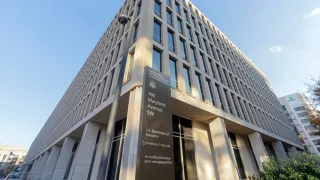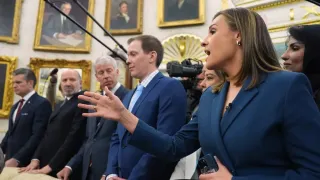
3 hours ago
"Let's Not Normalize This": Spanish Soccer Player Nacho Ruiz Stands Firm After Homophobic Abuse From Fans
READ TIME: 4 MIN.
On a football pitch in Quintanar del Rey, Spain, Nacho Ruiz did something beautifully defiant: he blew a kiss toward the stands of fans hurling homophobic slurs at him. It's a small gesture, really—the kind of thing that might go unnoticed in most contexts. But in the world of professional sports, where masculinity is still policed with an iron fist and queerness remains largely invisible, that kiss was a declaration.
The 28-year-old left-back for Unión Balompédica Conquense didn't let the moment pass quietly. Instead, he took to Instagram to detail the barrage of insults he'd received from what he described as"a large part of the stands." The slurs were relentless and deliberate:"faggot,""fucking faggot,""daughter of a bitch,""brat,""pretty girl," and perhaps most cutting,"poor mother who has a girl and not a man."
What makes Ruiz's response so striking isn't just that he spoke out—it's how he did it. He didn't frame his response as a victim seeking sympathy. Instead, he positioned himself as someone taking action on behalf of an entire community of athletes who've learned to absorb this kind of abuse in silence.
During a press conference on November 18, Ruiz articulated something that many LGBTQ+ people in sports have long understood but rarely hear stated so plainly:"It's the first time this has happened to me and I hope it's the last time, not just for me. In the world of football, we have very normalised that we receive insults."
That word—normalized—is doing heavy lifting here. It speaks to a systemic problem that extends far beyond a single match or a handful of bigoted fans. In professional football, homophobic abuse has become so commonplace that it's often treated as background noise, an unfortunate but inevitable part of the game. Players learn to expect it. Clubs sometimes tolerate it. Fans feel emboldened by the silence around them.
Ruiz's refusal to let this slide is significant precisely because it challenges that normalization. He wasn't interested in downplaying what happened or moving on quietly. Instead, he used his platform—both his social media following and his appearance at a formal press conference—to name the problem explicitly and to insist on better.
"Regardless of whether these insults affect me or not, which they don't," Ruiz explained on Instagram,"I think it is regrettable that in the 21st century there is still this hatred in football fields, whether it be homophobia, sexism, racism… let's not normalise this."
The distinction he makes is crucial. He's not asking for pity or claiming that the abuse wounded him—a framing that might invite paternalism or dismissal. Instead, he's making a moral argument: that in 2025, we should expect better from our institutions and our culture. The fact that he has to make this argument at all speaks volumes about where football still stands on LGBTQ+ inclusion.
Ruiz's visibility as both a footballer and a model adds another layer to his story. In many ways, he embodies a kind of queerness that's increasingly visible in mainstream spaces—stylish, confident, unapologetically himself. Yet that very visibility seems to have made him a target. He noted that he's received similar abuse on social media simply because of"the way I dress," yet this was the first time it escalated to in-person harassment at a match.
There's a painful irony here: in a world where LGBTQ+ people are increasingly visible in culture and media, sports remain stubbornly behind. Football, in particular, has struggled with homophobia in ways that other industries have begun to address. While Ruiz's presence as a visible queer athlete is important, it also renders him vulnerable to the particular venom that gets directed at anyone who refuses to stay invisible.
His decision to speak out publicly, then, takes on additional significance. By naming what happened and refusing to accept it as normal, Ruiz is doing the work of cultural change—work that shouldn't fall on individual athletes but often does.
Ruiz's team, Unión Balompédica Conquense, responded swiftly with a statement that stood firmly beside their player."Football should be a space of respect and enjoyment for all involved, including the fans, and situations like yesterday's in Quintanar should never be repeated in the 21st century," the club wrote, concluding with a simple but powerful declaration:"We're with you, Nacho."
This kind of institutional backing matters enormously. When a club publicly supports a player who's been targeted with homophobic abuse, it sends a message that such behavior is unacceptable. It also provides a layer of protection that not all athletes have, particularly those in lower-profile or semi-professional leagues where resources and advocacy infrastructure may be limited.
Yet the fact that this needs to be noteworthy—that a club's simple statement of solidarity with a player who's been abused is worth highlighting—underscores just how far the sports world still has to go.
When asked why he decided to go public, Ruiz was clear:"He said he brought it to the football platform so that no other footballer has to go through something similar," drawing attention not just to his Instagram following but to the wider football world.
This is the work of advocacy. Ruiz isn't centering his own hurt; he's centering the collective well-being of other athletes who might face similar treatment. It's a form of solidarity that extends beyond his own experience and into the realm of systemic change.
For LGBTQ+ readers, particularly those in sports or those who care about the role of athletics in society, Ruiz's stance offers something increasingly rare: a refusal to accept homophobia as an inevitable part of the game. He's not asking for special treatment or coddling. He's simply insisting that in the 21st century, we can do better.
The question now is whether Ruiz's courage will catalyze broader change within Spanish football and beyond. Will his club take additional steps to address fan behavior? Will other players feel emboldened to speak out? Will governing bodies take seriously their responsibility to create safe spaces for all athletes?
These are open questions. But what's certain is that Nacho Ruiz has made it impossible to ignore the problem. He's refused the silence that has historically protected both perpetrators and bystanders. In doing so, he's offered a model for what accountability and courage can look like in spaces where they've been sorely lacking.
For now, his message is clear: let's not normalize this. Not in football. Not anywhere.






